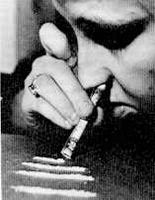Man my
TV Turnoff Week went fucking great. I didn't watch one second of TV. Well, I mean I watched some B-Ball obviously, and I definitely played X-Box. Also, I had to watch my faves: Cheaters, Elimidate, etc. So all this aside: Another strikingly successful TV Turnoff Week for the books.
I know. I felt just that much more worthless watching TV this week because it was supposed to be off. Although I crashed and burned, I still think TV is stupid. On a post I wrote last week I mentioned a piece of pro-TV propaganda by Mitchell Stephens which called for a completely visual culture. Since that post, there has been some more literature in favor of TV Turn-on Forever.
This one is from Steven Johnson (via the NYT), author of the book "Everything Bad is Good for You":
For decades, we've worked under the assumption that mass culture follows a path declining steadily toward lowest-common-denominator standards, presumably because the ''masses'' want dumb, simple pleasures and big media companies try to give the masses what they want. But as that ''24'' episode suggests, the exact opposite is happening: the culture is getting more cognitively demanding, not less. Johnson makes the argument that increasingly complex storylines and parrallel storylines found in contemporary TV dramas have strengthened the cognitive mapmaking structures of its audience. He believes TV makes you smarter. Its called "The Sleeper Curve":
This is what I call the Sleeper Curve: the most debased forms of mass diversion -- video games and violent television dramas and juvenile sitcoms -- turn out to be nutritional after all.I believe that the Sleeper Curve is the single most important new force altering the mental development of young people today, and I believe it is largely a force for good: enhancing our cognitive faculties, not dumbing them down. He makes the point that TV shows make less efforts to explain the obvious, forcing audiences to use critical skills to unfold unexplained meanings. Example: On
ER , a surgery scene may be full of medical jargon that is indecipherable to laymens. Johnson argues this type of language challenges viewers to become more literate on the subject. He ends the article with a suggestion to parents:
If your kids want to watch reality TV, encourage them to watch ''Survivor'' over ''Fear Factor.'' If they want to watch a mystery show, encourage ''24'' over ''Law and Order.'' If they want to play a violent game, encourage Grand Theft Auto over Quake. I don't agree with Johnson on many levels. First, I argue that the show-commercial-show structure format results in molding viewers attention spans into 10-minuite intervals. Even Johnson notes that the amount of commercials per hour is on the rise; currently at about 20 minutes/hour or a 2-1 ratio.
Second, I would say that the current MTV editing style, invented by Mark Pellington, mastered by commercial and artistic interests alike, is absolutely terrible for our attention spans. Eisenstein argued that montage is the New Cinema, where jamming images down the throat of a viewer challenges the audience to digest lots of info very quickly. While I say that montage offers lots in artistic ventures, the constant changing and shifting of images and angles breaks down our concentration, we lose focus. Do you really think contemporary audiences would be able to handle the three-minute single-shot opening of Orson Welles' "Touch of Evil," in which there is no visual stimulation for what seems like ages? Your attention resets everytime the image changes. That's why you may find yourself almost hypnotized like a baby staring at a nipple while watching MTV. Try watching a show on MTV. See how many times they change the image. Compare it to Nick at Nite or an old movie. Note results and how it made you feel monkey.
Lastly: Johnson argues that the positive benefits of cognitive reinforcement overshadow the negative effects of the shallow values TV perpetuates. Hence, it is OK if your 10-year-old daughter thinks Paris Hilton is her role model because at least she can remember things better. This is the doomsday scenario for me. A generation of TV-juiced evil and amoral geniuses.
I was surprised last week when I saw an
article in Reason Magazine - which I usually found quite sound - denouncing TV Turnoff Week as heretic:
All that may explain why the turners-off have had to goose publicity for Turnoff Week by converting an innocuous voluntary exercise into a campaign of public obnoxiousnessSanchez misses the point on the significance of TV Turnoff Week here. He urges to plug the cord back in and tune-out because you're bored and its OK. Ah, the things we do when we are bored...I have tried catnip. The point of TV Turnoff Week is to get back in touch with the real world outside your home and get back in touch with human communication. Kalle Lasn sums it up pretty well in an
interview on ABC Radio's All in the Mind:
If you continue watching three or four hours of TV every night, if you continue to spend two or three hours in front of your computer every day and another maybe four or five hours at work in front of your computer and if you spend 90% of your waking life in an electronic environment, then after a while you forget what real life is all about.While Lasn might be right its probably OK to spend a lot of times reading (my) blogs because they make you feel more confident. I look at TV as an opportunity-cost analysis. While watching TV for ten hours may make it easier at the water cooler, think of all the cool shit you could have been doing like finishing that novel on unicycle gangs. I apologize for the long post. Think of all the cool shit you could have been doing instead of reading it. For those of you still with me, send me proof that you finished to whole thing and I will send you some leftover (egg?) matzah.





